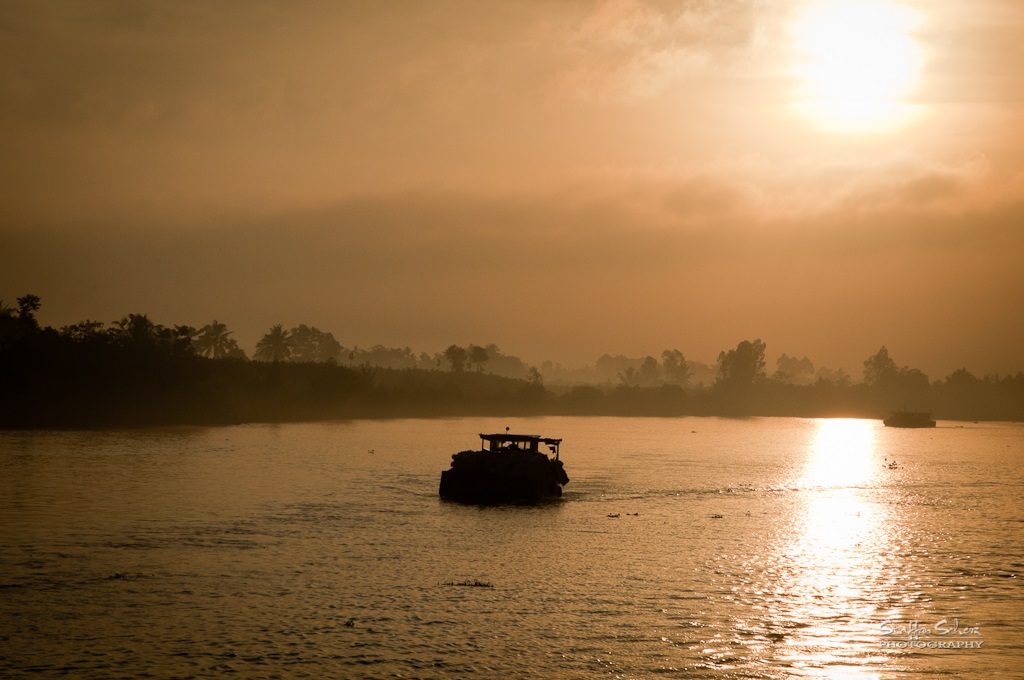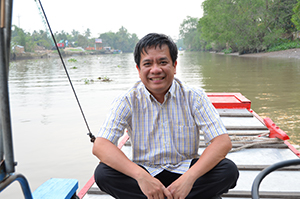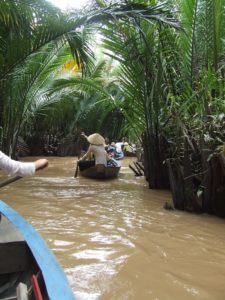Climate change is threatening one of the world's most important rivers, and impacting millions of people.

Sunrise in the Mekong Delta. Image credit - Staffan Scherz/Flickr
Sunrise in the Mekong Delta. Image credit – Staffan Scherz/Flickr
Dealing with the impacts of climate change isn’t just a big challenge for Australia, the whole world is grappling with the dramatic effects of a warming globe. So there’s never been a more important time for us to share our world-class expertise with colleagues around the planet.
One collaboration in particular is helping millions of people in the Mekong Delta in Vietnam. One of the largest food-producing deltas in the world, the Mekong is already feeling the impacts of climate change, with extreme droughts lowering water levels, while rising sea levels are pushing salty water upstream.
Enter the Dragon

Dr Minh Nguyen in the Mekong Delta, Vietnam.
Dr Minh Nguyen in the Mekong Delta, Vietnam.
The Dragon Institute, which is part of Can Tho University in Vietnam stands for Delta Research and Global Observation Network (DRAGON). Formed in 2008, the institute leads the region in climate adaption research and development.
In 2009, the Dragon accumulated some Aussie gold in the form of our researcher, Dr Minh Nguyen. Born in Vietnam and a researcher with us since 2000, Minh initiated and led a project to develop strategies and solutions to improve the city’s planning for water resources, as well as building resilience in local communities for the challenges that lie ahead. The project, ‘Climate Adaptation through Sustainable Development of Water Systems for Can Tho City’ ran until 2014.
During that time, the project not only built new research capabilities for the Dragon Institute, it also produced lots of practical tools for the community to put into action, like a Rainwater Harvesting Guidebook for the Mekong Delta.
“It rains a lot for six months of the year in the Mekong Delta region and then they have virtually no rain at all,” Minh said.
“Previously capturing and storing rainwater for various domestic uses was done in an ad hoc manner. This guidebook timely met the need of the local communities in adapting to the changing climate and environment.”
A Helping Hand
In March, Minh picked up a prestigious Recognition Award from the Can Tho University to celebrate their 50th anniversary. He says while his career has earned him awards from prestigious organisations such as the Japan Science and Technology Agency, Vietnam’s Ministry of Energy, the American Wood Council and the US Forest Products Society, and the Institute of Engineers Australia, this one was extra special.
“To me, this award is not about the work I did in Vietnam but the relationships I built with young researchers and their local communities. It was important they felt like they could talk to me and trust me,” Minh said.

A unique climate change challenge - the Mekong Delta. By Teijo Hakala, Mekong Delta river, CC BY-SA 2.0.
A unique climate change challenge – the Mekong Delta. By Teijo Hakala, Mekong Delta river, CC BY-SA 2.0.
“These people are young and enthusiastic and really want to find solutions to climate change, they just needed the CSIRO experience to help in an advisory way.”
While continuing to serve as a trusted research advisor, Minh is now working on a proposal to establish a sustainable development research centre at The Dragon Institute – a joint venture between the University and CSIRO.
You can read more about Australia’s research partnership with Vietnam here.


Pingback: How CSIRO and GE are shaping our future | GE Reports Australia, New Zealand & PNG